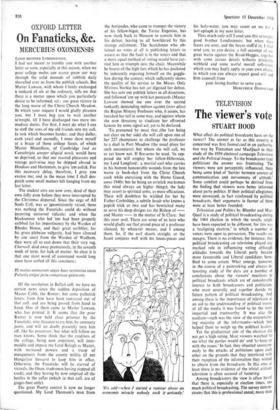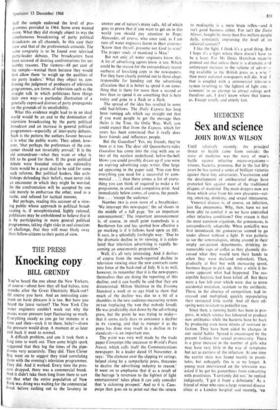The viewer's vote
TELEVISION STUART HOOD
What effect do political broadcasts have on the viewer? The answer as far as this country is concerned was first formulated in an authorita- tive way by Trenaman and MacQuail in their study of the 1959 electoral campaign Television and the Political Image. To the broadcaster (and politician) the answer was frustrating. The viewers were not perceptibly influenced, there being some kind of 'barrier between sources of communication and movements of attitude.' Some comfort could perhaps be derived from the finding that viewers were better informed about party politics. If their political allegiances were unswayed, in fact reinforced by political broadcasts, their arguments in favour of them Were at least better founded..
Television and Politics by Bitimler and Mac- Quail is a study of political broadcasting during the' 1964 election in which the results Might have been expected to be different; for this was a 'realigning election,' in which a number of voters were open to persuasion. The results are meagre. There is no evidence, for instance, that political broadcasting on television played any marked role in influencing voting although attitudes towards the Liberal party became more favourable and Liberal candidates bene- fited to some extent. What emerge, however, in the course of a painstaking and always in- teresting study of the data are a number of conclusions about the viewers' reactions to political broadcasts which are of considerable interest to both broadcasters and politicians, who must severally and together decide the 'future pattern of political broadcasting: And among these is the importance of television as an aid to the understanding of political issues; of all the media it was found to be the most impartial and trustworthy. It was also the medium—such was the view of the overwhelm- ing majority of the informants—which best helped them to weigh up the political leaders. Yet the gladiatorial side of the election did not get a high rating. Most viewers watched 'to see what the parties would do' and `to keep up with the issues.' In fact, they objected spontane- ously to the attacks of politicians upon each other on the grounds that they interfered with their reception of the information they wished to obtain from the broadcasts. In this area at least there is no evidence of the trivial attitude television is often accused of fostering.
Among broadcasters the view is often heard that there is, especially at election times, too much political broadcasting. The survey demon- strates that this is professional ennui; more than half the sample endorsed the level of pro- grammes provided in 1964. Some even wanted more. What they did strongly object to was the simultaneous broadcasting of party political broadcasts on all channels. In this case their view and that of the professionals coincide. The same congruity is to be found over televised party-leader debates. The broadcasters have been accused of desiring confrontations for un- worthy reasons. The viewers-68 per cent of the sample—wanted them because they would best allow them `to weigh up the qualities of the party leaders.' What they object to, con- firming the judgment of producers of television programmes, are forms of television such as the straight talk in which politicians have things their own way—a particular illustration of a generally expressed distrust of party propaganda on the grounds of its unreliability.
What this evidence might lead to in an ideal world would be an end to the domination of television broadcasting by the party political broadcast and an increase in general political programmes—especially of inter-party debates. Such is the pattern the authors favour because it is what the public wants. They admit, how- ever, 'that perhaps the preferences of the con- sumer should not invariably prevail.' It is the old conundrum—what they want or what is felt to be good for them. If the great political debate were founded strictly on rationality there would be a great deal to be said for some such reforms. But political leaders, like arch- bishops defending their beliefs, must never risk an encounter in which they might be worsted. So the confrontation will be accepted by one side merely to embarrass the other, used as a tactic, and refused for tactical reasons.
But perhaps, reading this account of a view- ing public whose approach to political broad- casting is, if unsophisticated, highly rational, politicians may be emboldened to believe that it is by participating in more general political programmes, taking slight risks in real situations of challenge, that they will most likely sway their fellow-citizens to their point of view.















































 Previous page
Previous page